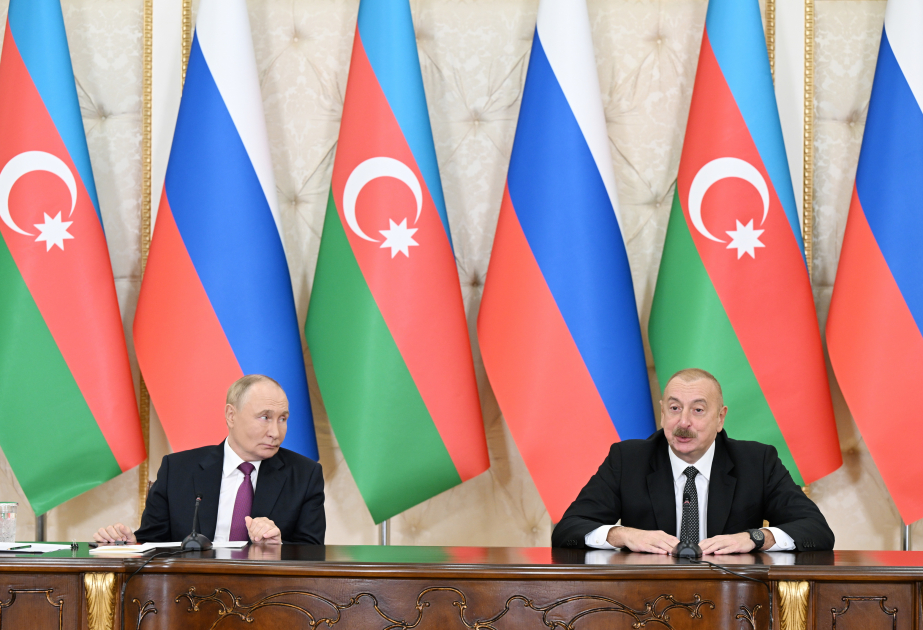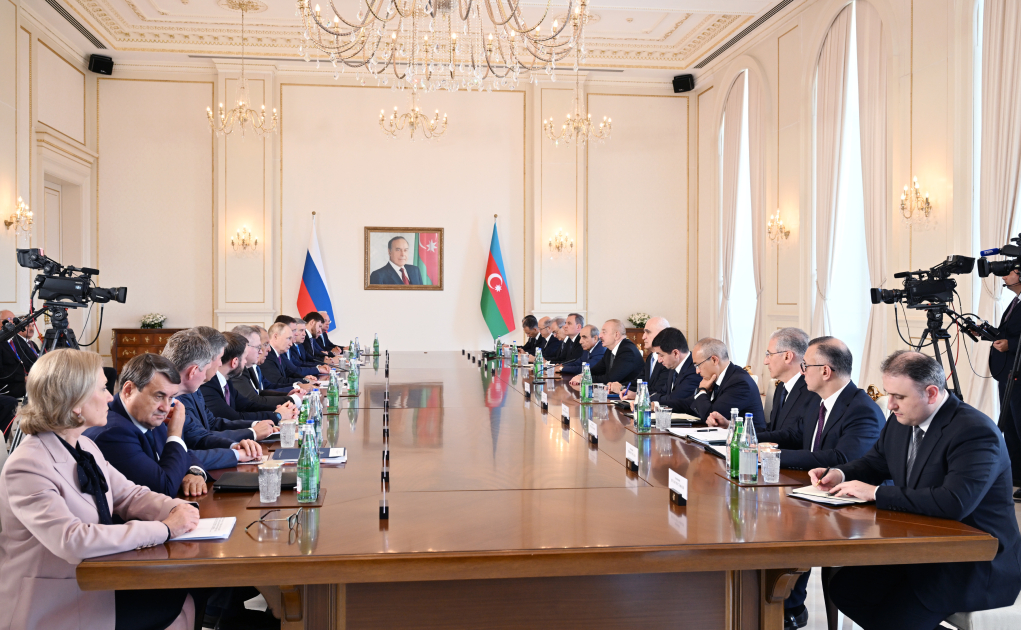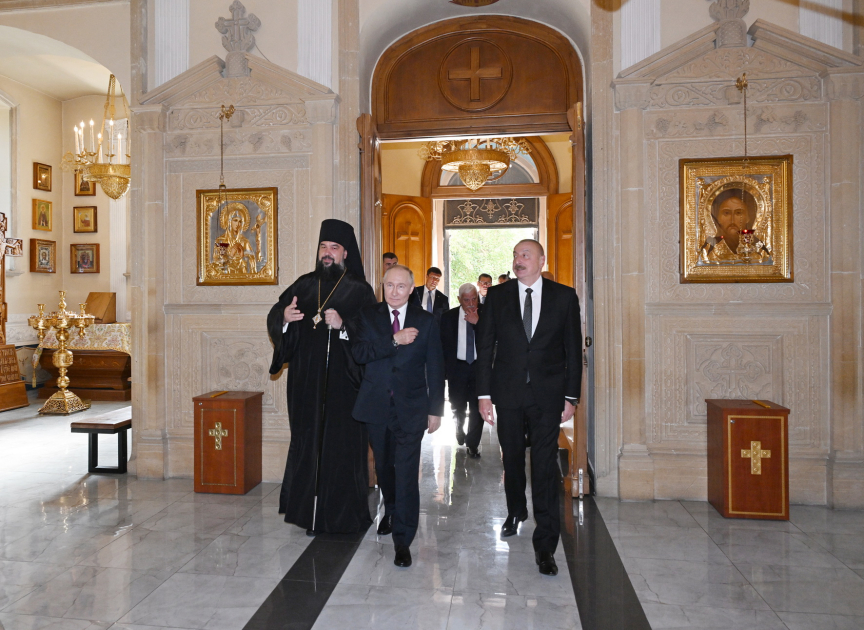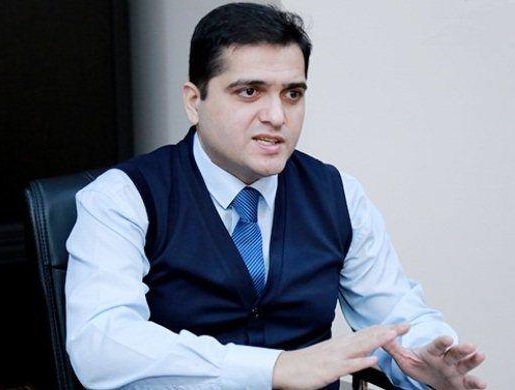Vladimir Putin made an official visit to Baku
Putin visited Baku
“Everyone understands that Russia is also facing crises, particularly regarding Ukraine… However, Russia’s historical involvement in the South Caucasus in recent years makes it necessary for us to engage in these events,” said Russian president Vladimir Putin during a meeting with Azerbaijani president Ilham Aliyev in Baku.
According to an Azerbaijani analyst, Putin’s message was that “even though Russia’s main focus and resources are directed toward the war in Ukraine, the Kremlin will not sideline its interests in the South Caucasus.“

Vladimir Putin in Baku
Russian president Vladimir Putin arrived in Baku late on the evening of August 18. He was welcomed at the airport by Azerbaijan’s first deputy prime minister Yagub Eyubov, deputy foreign minister Samir Sharifov, and the Azerbaijani Ambassador to Russia, Polad Bulbuloglu.
That same evening, the Russian leader had dinner with the president of Azerbaijan and the First Lady in an informal setting.
Visit program
The main official and working events in the Russian leader’s schedule were planned for Monday, August 19. As part of the official visit protocol, president Putin visited the Alley of Honor and laid a wreath at the grave of Azerbaijan’s national leader, Heydar Aliyev. He then paid his respects at the Alley of Martyrs, honoring those who died for Azerbaijan’s independence and sovereignty.
The state visit officially began with a welcoming ceremony for the Russian leader by president Ilham Aliyev. The ceremony took place at the Azerbaijani leader’s seaside residence, “Zagulba,” on the shores of the Caspian Sea. The two presidents first held a private meeting, followed by extended Russian-Azerbaijani negotiations.

Following two rounds of negotiations, the presidents issued a joint statement and signed several intergovernmental and other documents. After the signing ceremony, Putin and Aliyev briefed the media on the outcomes of their discussions.
However, Putin’s visit to Azerbaijan didn’t end there. Aliyev introduced his Russian counterpart to the Baku White City project, aimed at revitalizing and developing the eastern part of the capital. The leaders toured the White City area together and later visited the Cathedral of the Holy Myrrh-Bearing Women.
To mark the end of the visit, Aliyev hosted a state reception in honor of his Russian guest.

Joint statement by Putin and Aliyev
“The parties agreed to continue strengthening interstate relations based on the principles of mutual respect for state sovereignty, independence, territorial integrity, equality, and non-interference in each other’s internal affairs.” This is stated in the Joint Declaration by the presidents of the two countries, adopted following the negotiations between Vladimir Putin and Ilham Aliyev.
The document, consisting of 17 points, emphasizes the importance of further developing cooperation in international organizations and on multilateral platforms.
“Russia and Azerbaijan reaffirmed their commitment to fostering a world order based on international law, free from double standards, and without creating dividing lines.”
The parties acknowledge the important role of the Shanghai Cooperation Organization (SCO) in maintaining peace, security, stability, and sustainable development. Russia supports Azerbaijan’s interest in elevating its status within the SCO and strengthening its cooperation with BRICS.
“The parties emphasized the significance of the trilateral statement of November 9/10, 2020, as well as subsequent agreements reached at the highest level, to ensure security and sustainable development in the South Caucasus. The Russian Federation reaffirmed its readiness to further assist in the normalization of relations between the Republic of Azerbaijan and the Republic of Armenia.”
The parties intend to continue active cooperation to conduct activities in the Caspian Sea in accordance with the Convention on the Legal Status of the Caspian Sea of 2018.
The heads of state stressed the importance of further strengthening bilateral industrial and agricultural cooperation, expanding tourism and transit flows, including through the development of air traffic, as well as rail and multimodal freight transport and infrastructure on the North-South International Transport Corridor (ITC).
The leaders of the two countries highlighted the significant potential for cooperation between Russian regions and Azerbaijan in enhancing bilateral economic ties.
Russian president Vladimir Putin’s press statement
- Russia places great importance on the development of multifaceted friendly relations with Azerbaijan.
- These relations are based on principles of equality, mutual interests, and the deep cultural and human ties that have united our peoples for centuries.
- Russian companies like LUKOIL, KamAZ, Sollers, and UAZ are thriving in the Azerbaijani market, thanks to the favorable conditions provided by Azerbaijan’s regions. “Transmashholding” recently signed a new contract to produce a large batch of Russian-made wagons for the Baku Metro.
- The United Shipbuilding Corporation of Russia, in collaboration with the Baku Shipyard, is starting the production of modern “river-sea” tankers for transporting oil products.
- The Russian language is widely and freely used in Azerbaijan, a trend strongly supported by the Azerbaijani leadership. We appreciate this attention to the Russian language, Ilham Heydarovich.
- The idea of establishing a Russian-Azerbaijani university in Baku is under discussion, and president Aliyev has expressed his support. We hope to implement this initiative swiftly.
Azerbaijani president Ilham Aliyev’s press statement
- The state visit of president Vladimir Putin to Azerbaijan is of special significance. While we met twice this year—once in Moscow and once at an international event—the format and nature of this state visit highlight the high level of our bilateral relations. The documents signed today, especially the Joint Declaration, reaffirm the friendly and allied nature of our relationship. The provisions of the February 2022 Declaration on Allied Cooperation are being successfully implemented. Our countries act as allies, friends, and close partners.
- The growth in trade turnover last year and in the first half of this year reflects our strong cooperation potential. We surpassed the $4 billion mark last year, and today’s meetings indicate that this is not the limit.
- Azerbaijan has always given special attention to humanitarian cooperation with Russia.
- There are 324 schools in Azerbaijan teaching in Russian, with around 160,000 students. Over 800,000 students learn Russian as a second language. Twenty-six Azerbaijani universities have Russian language departments, with over 15,000 students. Branches of Moscow State University and Sechenov University operate successfully. We also discussed the development of educational relations.
- We discussed regional security issues in detail during the closed-format meeting. Since September last year, a new situation has emerged in the region. Azerbaijan has fully restored its sovereignty and territorial integrity, opening new opportunities for establishing durable peace in the South Caucasus. The stability and security of the entire South Caucasus region depend significantly on close cooperation between Russia and Azerbaijan.
- We thoroughly discussed the “North-South” project, crucial for our interstate relations and regional transport corridors. The rail and road segments of the North-South corridor in Azerbaijan are fully operational. We are currently modernizing the railway section to increase its capacity, aiming to transport over 15 million tons of cargo per year.
- This year, Azerbaijan allocated around $120 million for the modernization of the railway section to achieve the required capacity.
- Undoubtedly, this visit is historic and will significantly contribute to strengthening our friendly and allied relations.
Expert commentary

Elkhan Shahinoglu, head of the Atlas Research Center, commented on the Russian president’s visit to Azerbaijan:
“During his meeting with Azerbaijani president Ilham Aliyev in Baku, Russian president Vladimir Putin stated that he is pleased with the improvement in economic and humanitarian relations between the two countries. The presidents expressed satisfaction with the growth in economic ties and trade. These are similar statements made by the two leaders at recent meetings.
It was interesting to see what Putin would say in Baku about the Ukrainian conflict and the South Caucasus.
‘Everyone understands that Russia is also facing crises, primarily related to Ukraine… However, Russia’s historical involvement in the South Caucasus in recent years dictates the need for our participation in these events,’ he said, noting that Russia’s involvement in the South Caucasus will be to the extent required by the parties.
‘There is no doubt about it. If we can do something to achieve a peace agreement between Azerbaijan and Armenia, resolve the issue of delimitation and demarcation of borders, and address logistics and economic issues, we will be very happy,’ the Russian leader emphasized.
What is the conclusion from this statement?
Firstly, Putin wanted to convey that, although Russia’s main attention and resources are focused on the Ukrainian war, the Kremlin will not put its interests in the South Caucasus on the back burner. This is evidenced by his visit to Azerbaijan amid Russia’s current difficulties.
Vladimir Putin also reminded Ilham Aliyev that after returning to Moscow, he will speak by phone with Armenian prime minister Nikol Pashinyan and inform him of the details of the Baku meeting. This is apparently required by diplomatic etiquette. However, this offer also suggests that, even if Pashinyan is not to his liking, he will maintain a balance between Azerbaijan and Armenia.
Although Putin stated that Russia will strive to achieve a peace agreement between Azerbaijan and Armenia, Baku and Yerevan do not need a mediator. In general, Baku and Yerevan do not require a mediator. Negotiations between Baku and Yerevan continue without a mediator, an intergovernmental commission is gathering on the border, and foreign ministers are discussing the text of the peace agreement by email.
Moscow may be chosen, like Washington and Berlin, as a venue for meetings between Azerbaijani and Armenian officials, but Yerevan is not favorable towards Russian mediation.
Russia’s desire to open a consulate in Karabakh is also incompatible with reality.”


















